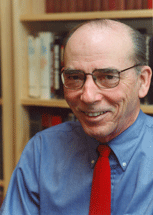Tony Judt was a public intellectual, born in 1948 into a Jewish Marxist family in England, who served two years in an Israeli kibbutz and then in the Israeli Army during the 1967 War. He studied all over Europe and finally found a distinguished home at New York University. There, beginning in 2008, he died slowly of Lou Gehrig’s disease while, with the help of Timothy Snyder, he composed his summing-up book, Thinking the Twentieth Century (Penguin, 2012). When he died in 2010 at age 58, he had published 13 books, including Past Imperfect: French Intellectuals 1944-1956 (1992), which established him as a voice to be reckoned with.
I encountered him first on a television documentary about Pope John Paul II and again in essays in The New York Review of Books, including his proposal in 2003 that Israel and Palestine become one binational state. Named for a cousin who died in the Holocaust, he never shelved his Jewish identity; but as a man of integrity, he could not embrace all of Israel’s policies.
Reading Thinking the Twentieth Century—in which Snyder engages Judt through fascism, Nazism, Communism, socialism, social democracy and capitalism—is a mixed pleasure, like sitting alone in a Paris cafe overhearing two very smart people rattle on about people you have never heard of—Ota Sik, Maurice Thorez—only to perk up at the mention of Stephen Spender, whose poetry course I took in 1967. It’s good to be reminded how little one knows.
In most reviews of Thinking, Judt is revered; although Francis Fukuyama in The New York Times Book Review slaps him for criticizing certain writers (including Fukuyama) and for his judgments on Israel. But Thinking the Twentieth Century is a high-level intellectual dialogue, which is why book reviews, as a literary form, exist. Judt tells a story about Norman Davies, author of Europe: A History, whom he offended in a review in The New Republic, but who generously reviewed Judt’s masterpiece, Postwar for The Guardian.
Judt used his dying years to tell us: Western intellectuals, except George Orwell, took too long to spot the evil of Stalin’s Communism; the historian’s first obligation is to tell the truth, then put it in context; the Iraq war was wrong from the start, and pundits like David Brooks and Thomas Friedman, who supported it, were ignorant and shallow; the intellectual must be a moralist, unafraid to raise his voice, though supporters will lack the courage to speak.
I have never feared death. But in the late 1970s I was hit with a pinched nerve which for months kept half my body in pain. The following year, when I moved to Rockhurst College in Kansas City, I suffered a weakened right arm and pectoral muscle. After several visits, the neurologist told me I did not have Lou Gehrig’s disease. I was stunned. I had never even considered it! For 40 years I have screened out the idea of a long, fatal disease by which I would melt away. But now I write this inspired by Tony Judt, history teacher and social democrat, who spent his last two years in a final attempt to convince us that universal health care, public transportation and equitable taxation are fundamental to the public good.
NOTE. After typing that last line I took a walk in the Philadelphia woods to a path that led to railroad tracks. The closest exit from the tracks was a station 90 yards ahead; so I walked the track, looking up from time to time for trains, and at the station stepped off onto the road. Suddenly, Whoosh!!! A train roared at 70 miles an hour through the spot where I had stood. Had I not left the track 10 seconds before, I would have been splattered afar—the “quick” death I thought I preferred.







Here it is Monday morning in Germany. On Friday evening and there were still only two responses and both addressed the PS and not the message!
And the same point can be made about the Commonwealth piece commenting on Israel's War Party. Almost no comment-except mine. That was Friday night and still no more comments.
Thirdly, I send out to my friends in USA and Germany a report and Margaret's words and her reference in Haaretz and a few words from me, but no comment came in return from both countries.
And then I remember a year ago when you wrote a well-meaning and mild piece about a possible one-state solution for the Palestinians, and all hell broke loose. The Syndicate ordered more than 90 punitive comments to your column.
Ray, you were bad and you had to be spooked and smeared! You should know better!
But AMERICA surely did not have to print the stuff from the Syndicate's Hate Corps.
The passivity of both AMERICASs staff and the readership is amazing. You would think the magazine was produced in Sicily.
Best
I share of course your love and appreciation for Tony Judt= a great exception that demonstrates the rule.